Ukraine crisis: Ukrainians prepare to go home to fight
- Published
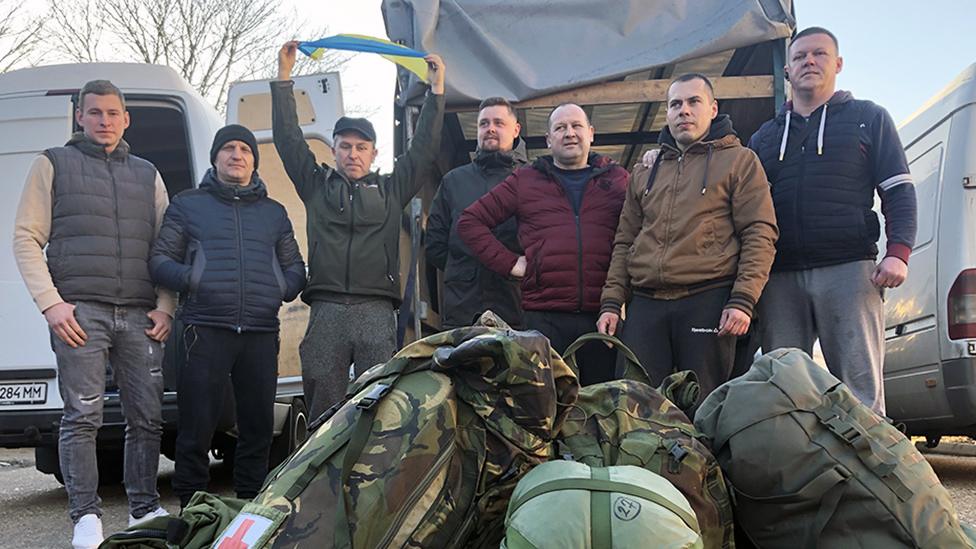
Ukrainian men from London plan to drive to the battlefield and fight the Russians
A growing number of Ukrainians living in Britain are buying surplus military equipment and preparing to head for the front lines in their homeland.
In a corner of a London industrial estate, a group of Ukrainian men are preparing for battle. Two large vans and a trailer are being stuffed with rations, flak jackets, helmets, medical packs, drones, even a mine detector.
Of this group, three plan to go back to Ukraine and take part in "territorial defence" and to "protect our Ukraine". They have military experience, having previously served in the Ukrainian army.
Viktor is one of them - we are not using his second name to protect his safety. He is overseeing a group of men, four of whom will be driving 1,200 miles (2,000 km) to deliver supplies to Ukraine.
He and two others plan to head for Western Ukraine, where they're from, and shore up "civil defence" forces.
Asked whether he expects to be fighting Russians, he smiles. "It is as if a stranger came into your house. And they would want to hurt your family, your children, your wife. I think any man would behave the same way as me and other guys here, who are all now going back to Ukraine."
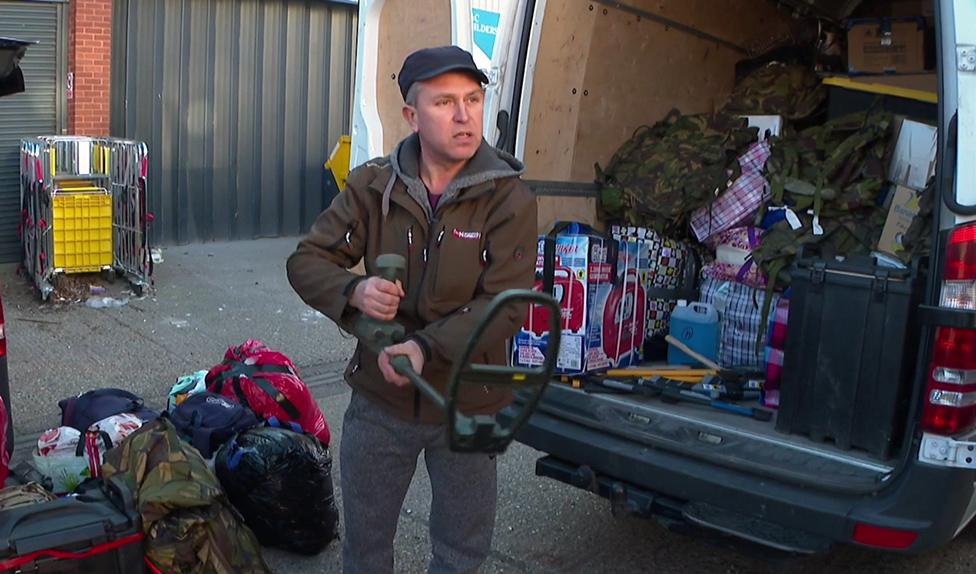
Viktor demonstrates a mine detector
Viktor came to the UK last year as a fruit picker. In 2014, he was drafted into the army when Russia annexed areas of Eastern Ukraine. He shows us pictures from back then, handling a heavy machine gun and rocket-propelled grenades. Another member of the group served in 2017.
The group has been frantically buying military surplus equipment. They show us flak jackets, helmets, British Army rations and off-the-shelf drones, which have been donated. The military gear is old. The jackets have small plates covering just the heart area, compared with modern equipment which protects more of the body.
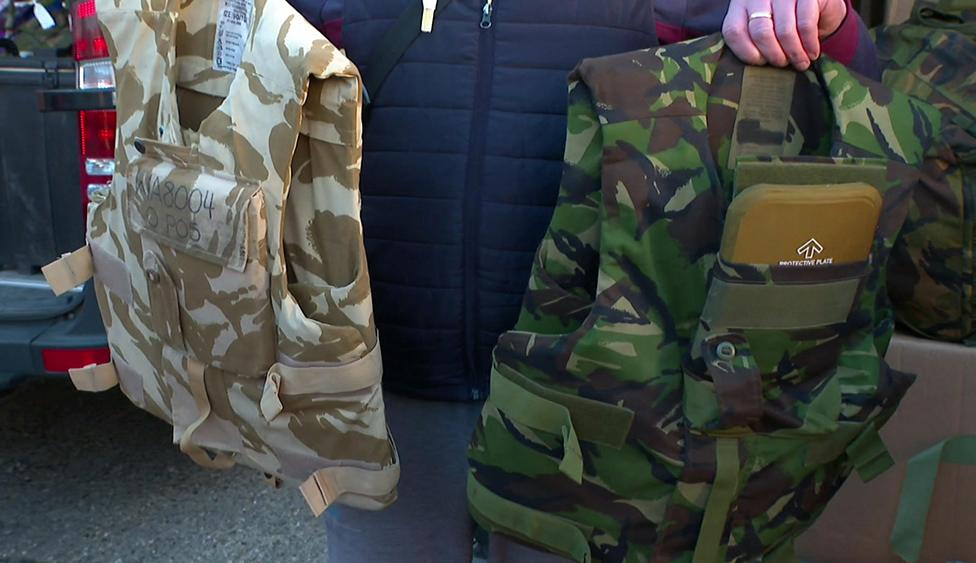
Much of the equipment is out of date
But British rations are better than Ukrainian ones, the men say. "More calories."
There are also military medical packs including tourniquets for stopping severe bleeding from blast injuries and gunshots. A pile of axes was loaded - to chop down trees, not as weapons, says Viktor.
In Essex, military surplus supplier Wozza, who asked us to use his nickname, has been taking orders directly from the front line and plans to send supplies via what he says is a "corridor" a contact has arranged.
When we meet, he's counting out 200 British uniforms. The camouflage material, light brown, is similar to that in use by the Ukrainian military. Different to the darker green and black used by the Russians.
That's why he's sending it. With so many volunteers now joining the ranks in Ukraine, wearing a range of jackets, there's a risk of misidentification on the battlefield which could lead to fighters injuring their own forces.
Bright armbands currently used to identify "friendly forces" bring their own risk of being spotted by the Russian military.
But Wozza has to take care in sending former British army equipment into a war zone in which Britain is not a combatant. Ukraine is not a member of Nato, and the UK has promised there will be no boots on the ground in this war.
And so Union Jack badges, unit insignia and stripes showing rank are stripped from the clothing before it goes into his van.
This is obsolete equipment. The protective helmets are not bullet-proof but will protect against falling debris or shrapnel.
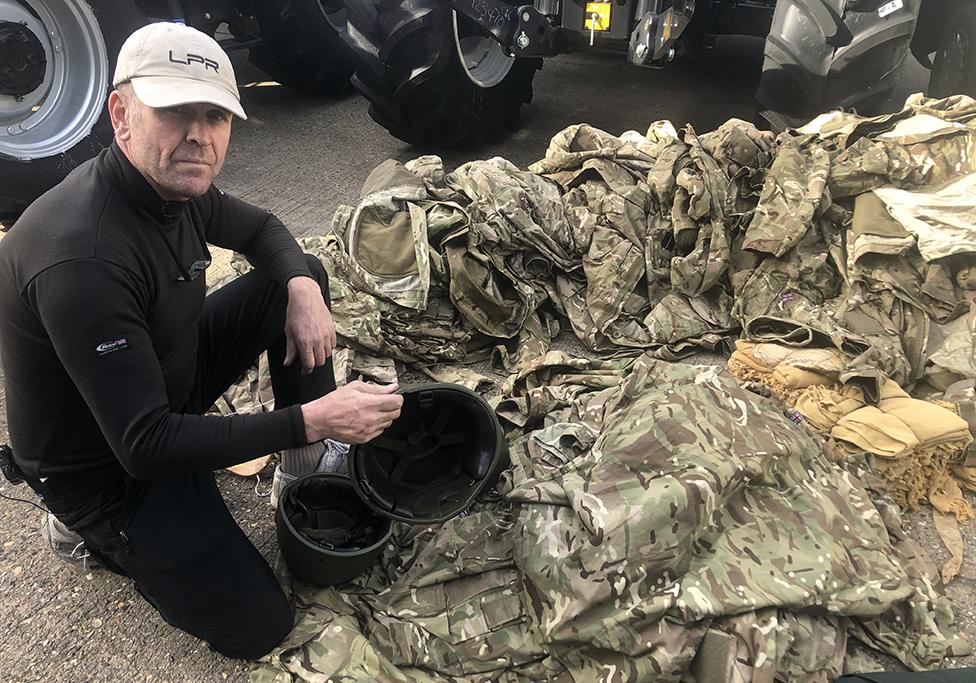
"Wozza" says 30 or 40 would-be fighters a day are buying equipment
None of it has been donated by the British government. He's bought it, and intends to supply it at the lowest possible cost. Ukrainian volunteers can't get enough, he says. "I've had young, old, brothers, all willing to go back to their homeland to defend it. I felt so humbled. There was a guy, 17, 18 years of age, buying kit for his brother. He was going to join him."
Thirty or 40 a day are turning up at his depot in Folkestone, Kent, and kitting themselves out. "Their plan is to get the basics, head over to Poland and straight on to the front line."
At a Ukrainian cultural centre in London we saw ex-Metropolitan police stab vests being loaded into a rear entrance along with supplies including sanitary supplies, boots and cereal bars. The centre has been signing up volunteers during the days since the Russian invasion.
Petro, 49, and Volodymer, 44, were among eight men who planned to leave on Monday afternoon heading for mainland Europe.
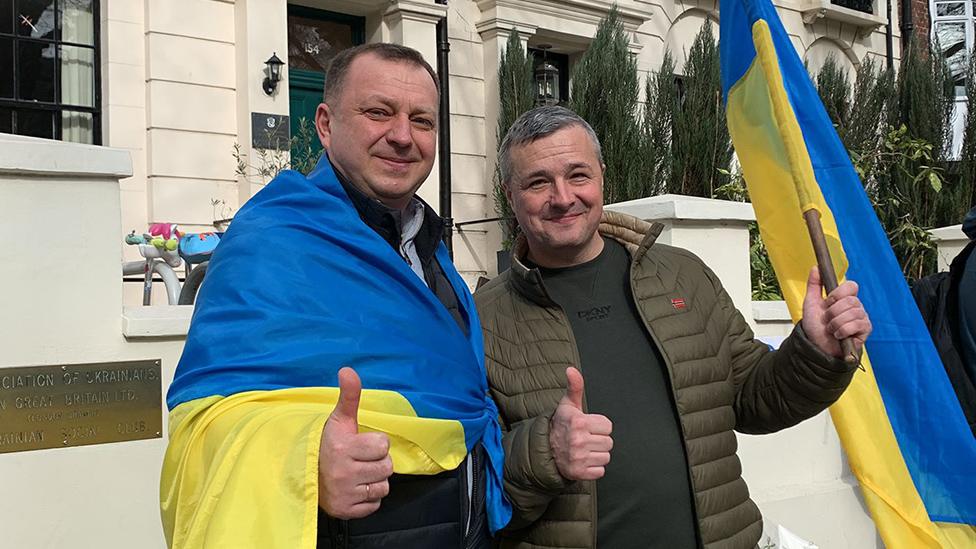
Petro and Volodymer have volunteered to go and fight in Ukraine
Two British men [not pictured] also arrived at the centre willing to go. Neither had military experience.
The British government's position on what Ukraine has called its "international legion" is confused. The Foreign Secretary Liz Truss said at the weekend she would welcome people in the UK travelling to fight. While anti-terrorism laws prevent people fighting with ISIS or other groups, there is no legal bar on Ukrainians or British citizens heading from the UK to the conflict in the west of the country - the eastern front may be off-limits, however.
According to government advice, external, if you travel to eastern Ukraine to fight, or to assist others engaged in the conflict, your activities may amount to offences against UK terrorism or other legislation and you could be prosecuted on your return to the UK. The FCDO isn't able to provide consular services to anyone in the parts of the Donetsk and Luhansk oblasts not currently under control of the Ukrainian authorities.
And the Defence Secretary Ben Wallace told Sky News "unless you are properly trained, unless you are an experienced member of an armed forces, I think there are better ways for you to contribute to the security of Ukraine."
Additional reporting by Vinnie O'Dowd.

Russia attacks Ukraine: More coverage
THE BASICS: Why is Putin invading Ukraine?
RUSSIA SANCTIONS: 'If I could leave, I would'
IN DEPTH: Full coverage of the conflict
